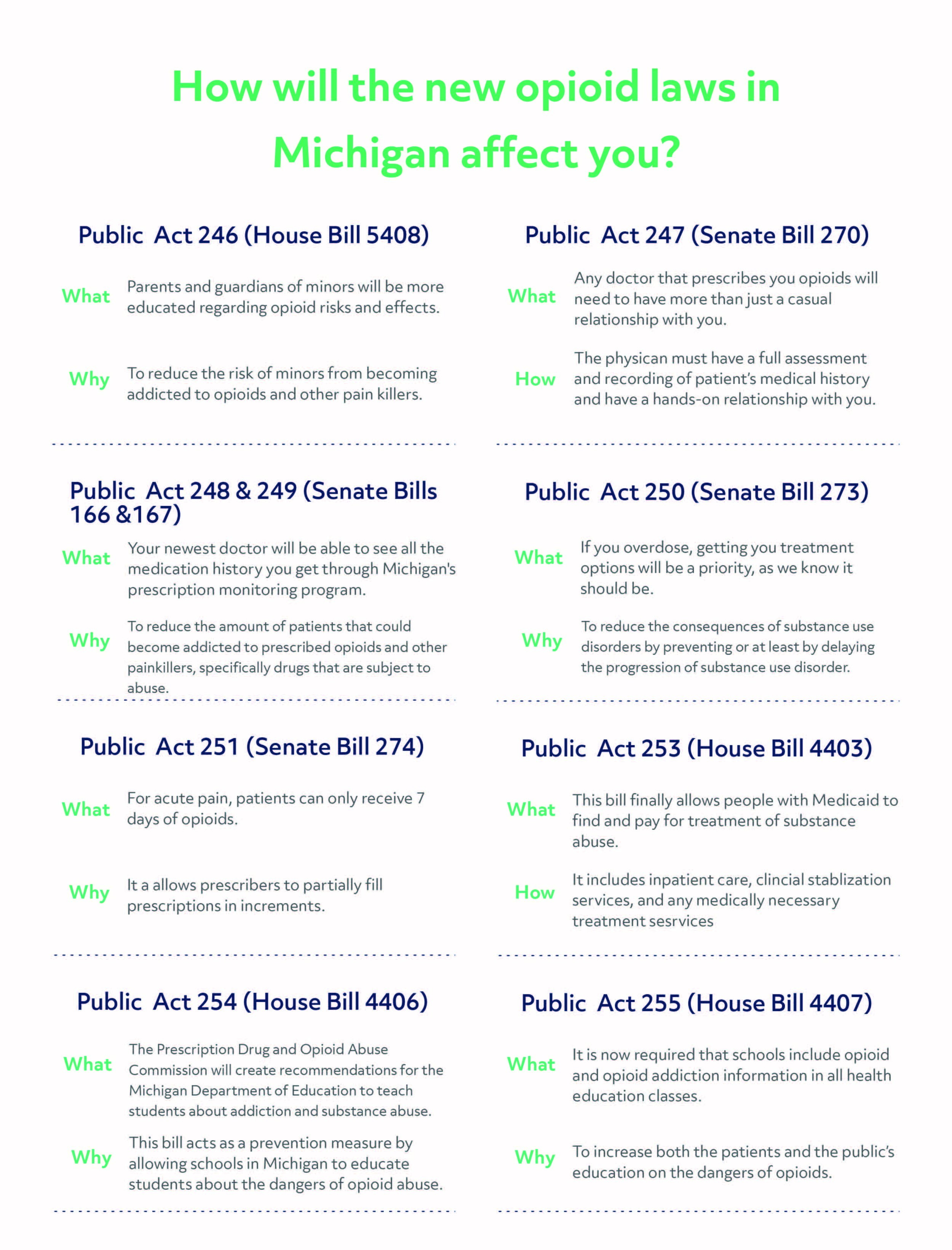New laws have been implemented in Michigan to combat the opioid crisis. How will they affect your care?
The opioid epidemic has grown to impact nearly every community in the state of Michigan and the need for addiction prevention resources has amplified. Lieutenant Governor Brian Calley, Governor Snyder, and a group of bipartisan legislators have passed new legislation this past year to combat the opioid epidemic in Michigan. This legislation implements recommendations give by the Prescription Drug and Opioid Abuse Task Force.
Here is a breakdown of the new opioid laws in Michigan:
Public Act 246 (House Bill 4408)
- Requires a prescriber to fully inform the parents/guardians of the risks a minor (anyone under the age of 18) may face with an opioid prescription. The parents/guardians must sign a consent form that outlines any risks and acknowledges that the patients and their parents/guardians understand these implications. The bill includes various punishments if there is failure to comply.
- This bill is meant to reduce the risk of minors from becoming addicted to opioids and other pain killers.
- The bill also emphasizes the need for both the patients and the parents/guardians to understand the exact implications and risks of the medications prescribed including:
- the dangers of opioid addiction,
- properly disposing expired, unused, or unwanted prescriptions,
- the fact that delivery of controlled substances is a felony under Michigan law,
- and the effects of reproduction, specifically exposing a fetus to a controlled substance.
The bottom line: Parents and guardians of minors will be more educated regarding opioid risks and effects.
Public Act 247 (Senate Bill 270)
Prescribers must have a bona fide physician-patient relationship before any controlled substances prescriptions.
Bona Fide includes:
- a hands-on physician-patient relationship,
- a full assessment and recording of patient’s medical history,
- any relevant physical examinations,
- a full review of previous examinations, treatments, and treatment responses especially any substance abuse history,
- thorough discussion of all the advantages, disadvantages, risks, effects, and alternatives of the prescribed medication,
- the development of a plan with set goals in response to the treatment,
- full documentation of the new treatment and the patient’s response,
- and communication with any other physicians seen by the patient.
The bottom line: Any doctor that prescribes you opioids will need to have more than just a casual relationship with you. If you’re struggling with opioid use, the team at Workit Health can help.
Public Act 248 & 249 (Senate Bills 166 & 167)
- A patient’s history of prescriptions must be checked in the Michigan Automated Prescription System (MAPS) BEFORE providing any controlled substances to the patient. The bill also includes disciplinary action against prescribers who do not use MAPS before prescribing opioids to a patient.
- This bill is meant to reduce the amount of patients that could become addicted to prescribed opioids and other painkillers, specifically drugs that are subject to abuse.
- By checking previous prescriptions, it will screen for patients who may be more at risk of abuse and it will verify that the new prescriptions do not counteract previous medications or that they do not result in any unforeseen risks.
The bottom line: Even if you don’t disclose all the treatment you are receiving to your newest doctor, they’ll be able to see the medications you get through Michigan’s prescription monitoring program.
Public Act 250 (Senate Bill 273)
- The Public Health Code has now been amended to include that all prescribers must provide patients who have experienced an overdose with information on substance use disorder services.
- This bill will increase prevention methods by informing patients of services right after being treated for overdose. These services are meant to reduce the consequences of substance use disorders by preventing or at least by delaying the progression of substance use disorder.
- Prevention methods will focus on the individual, support resilience and recovery, prevent any mental/behavioral disorders, and reinforce treatment to prevent relapse.
- Information of identifiable recovery-oriented services, such as early intervention and crisis intervention, referral services, and treatment services will be given to any current or former patients with substance use disorder.
The bottom line: If you overdose, getting you treatment options will be a priority. As we know it should be, overdose can be a catalyst for recovery when options are available.
Public Act 251 (Senate Bill 274)
- Limits the amount of opioids that can be prescribed for acute pain. It also allows prescribers to partially fill prescriptions in increments.
- If a patient has acute pain (pain that usually lasts for a limited amount of time), a prescriber can only prescribe an opioid for a maximum of 7 days.
- Public Act 252 (Senate Bill 47): MAPS must be used to monitor the dispensing of any controlled substances by prescribers.
The bottom line: For acute pain, patients can only receive 7 days of opioids.
Public Act 253 (House Bill 4403)
Allows treatment options for Medicaid beneficiaries who are suffering from substance use disorder. Treatment options now include:
- inpatient care,
- clinical stabilization services,
- and any medically necessary treatment services.
The bottom line: This bill finally allows people with Medicaid to find and pay for treatment of substance abuse.
Public Act 254 (House Bill 4406)
The Prescription Drug and Opioid Abuse Commission will create recommendations for the Michigan Department of Education to teach students about addiction and substance abuse.
The bottom line: This bill acts as a prevention measure by allowing schools in Michigan to educate students about the dangers of opioid abuse.
Public Act 255 (House Bill 4407)
Requires schools in Michigan to provide education on opioids and the risk of addiction in the curriculum for health education.
The bottom line: It is now required that schools include opioid and opioid addiction information in all health education classes.
The state of Michigan has taken several measures to decrease the prevalence of opioid addiction. These bills are meant to act not only as prevention methods, but also to increase both the patients and the public’s education on the dangers of opioids. By implementing these regulations, Michigan has taken one step forward in curbing the opioid epidemic. What do you think about the new laws? Tell us in the comments.





